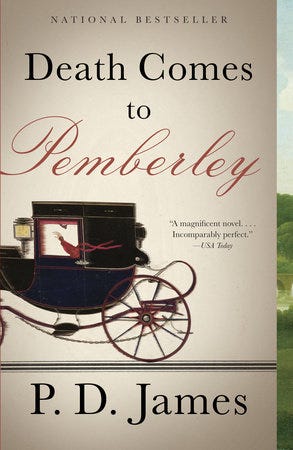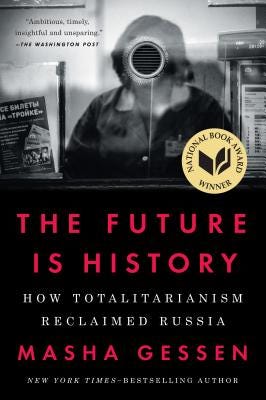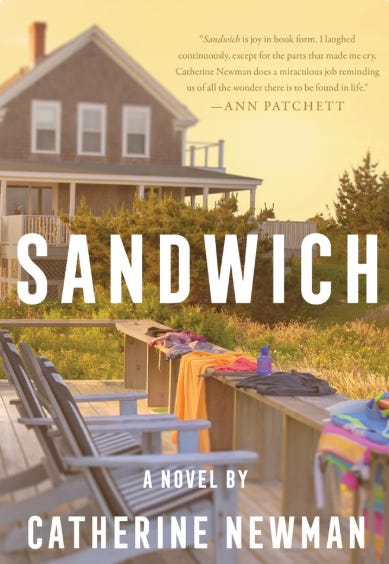Bookworm: May 2025
'Death Comes to Pemberley,' 'Counterfeit,' 'The Future is History,' 'The Swimmers,' 'Sandwich'
This post contains an affiliate link or links. If you use a link to buy a book, I may earn a small commission. You can find all the books that have been featured in this newsletter in my Bookshop store.
I know that meteorologically speaking, summer doesn’t begin until June 20, but my neighborhood bookstore launched its annual summer Book Bingo challenge on Memorial Day, so as far as I’m concerned, it’s summer reading season. And yes, I did visit the bookstore on Memorial Day just to pick up a Book Bingo card and yes, I have already completed a Bingo square. Here’s to Hot Bookworm Summer!
Table of contents
Mystery: “Death Comes to Pemberley,” by P.D. James
Fiction: “Counterfeit,” by Kirstin Chen
History: “The Future is History: How Totalitarianism Reclaimed Russia,” by Masha Gessen
Fiction: “The Swimmers,” by Julie Otsuka
Fiction: “Sandwich,” by Catherine Newman
“Death Comes to Pemberley”
My 2025 project of honoring Jane Austen’s 250th birthday continues with a re-reading, after many years, of iconic mystery author P.D. James’ sequel to “Pride and Prejudice.”
We’ve jumped forward enough years from the original that Elizabeth and Fitzwilliam Darcy are now the parents of two small boys. Elizabeth has settled into Pemberley, the estate of her husband’s family, and its traditions. These include hosting an annual ball, just days away when the book opens.
The guest list for the ball pointedly does not include Elizabeth’s disgraced sister Lydia or her equally disreputable husband, George Wickham. But the Darcys have reckoned without Lydia’s recklessness. Determined to be seen at Pemberley’s event of the year, Lydia has coaxed George and his best friend, Lt. Denny, to take her to the estate, as she’s sure her sister won’t snub her in person. Her arrival is a bigger surprise than even she anticipated, as she stumbles out of a carriage in a panic, screaming about a murder. Oh, and her husband and his friend have vanished.
The ball is canceled. Instead, the surrounding county of Derbyshire is treated to the early 19th-century equivalent of a media circus as an investigation is launched. James takes the shrewd approach of setting the death on Pemberley grounds and making Darcy a local magistrate, so that he and his family are drawn into the center of the spectacle. Indeed, much of the book is told from Darcy’s perspective.
For fans of Austen and mysteries, “Death Comes to Pemberley” is a highly satisfying mashup.
“Counterfeit”
Singaporean American novelist Kirstin Chen’s clever caper came to me courtesy of a book club that abruptly collapsed when its leader left the organization that was hosting the club. I had bought the novel but hadn’t yet read it, so it sat forlornly on a bookshelf until this month, when I decided to read it in honor of Asian American, Native Hawaiian, and Pacific Islander Heritage Month.
What can I say about “Counterfeit” without spoiling it? (So many layers.) It’s about knockoff designer handbags (the kind that that if you have to ask how much…). It’s about a long-ago friendship renewed unexpectedly, in odd circumstances (what does she really want?). It’s about the lives we have and the lives we wish we had (and how we can get stuck in between). It’s about West vs. East (or, depending on your perspective, East vs. West). It’s about how women, particularly Asian women, are perceived and empowered (or not). It’s about unreliable narrators (is it ever).
There’s so much to unpack in “Counterfeit,” I truly regret that book club didn’t have a chance to discuss it. Maybe we can start our own discussion. If you’ve read it, drop me some thoughts.
“The Future is History: How Totalitarianism Reclaimed Russia”
Don’t be put off by the textbook-like title of “The Future is History: How Totalitarianism Reclaimed Russia.” Journalist and author M. Gessen’s 2017 National Book Award winner tells the backstory of Vladimir Putin’s Russia through the eyes of four Russian Millennials, putting a very human face on this work. Gessen’s subjects were born in the mid-1980s, meaning they came of age as the Soviet Union crumbled; their generation of Russians has lived its entire adult life under Putin’s rule.
Gessen, for their part, is a Gen Xer, having been born in 1967 in Moscow. At a lecture in Portland this month, Gessen described what it was like to grow up in the Soviet Union well before perestroika and glasnost. When Gessen’s parents decided to emigrate to the United States in 1981, a friend asked them, in all seriousness, How do you know the West exists?
Gessen’s parents had previously gotten a peek outside the Iron Curtain, thanks to a sanctioned trip, so they were confident their family wasn’t about to fly off the edge of the world. But that question has lingered in my mind and even taken a turn: Does the West today exist the way I always assumed it did and forever would when I was growing up? Gessen’s book is a sobering examination of how Russia got where it is today, a cautionary tale for the rest of us.
“The Swimmers”
For someone who swims poorly, and therefore doesn’t enjoy swimming, I have spent a lot of time in and around pools, thanks to years of mandated swim classes as a kid and then more years of toting my own kids to swim classes mandated by me so they wouldn’t also swim poorly.
So I had good context to appreciate author Julie Otsuka’s latest novel, “The Swimmers,” which opens with a deep dive (couldn’t resist) into the minds of devoted swimmers at a private pool. Swimming is their routine, their release.
…[F]or a brief interlude we are at home in the world. Bad moods lift, tics disappear, memories reawaken, migraines dissolve, and slowly, slowly, the chatter in our minds begins to subside as stroke after stroke, length after length, we swim. And when we are finished with our laps we hoist ourselves up out of the pool, dripping and refreshed, our equilibrium restored, ready to face another day on land.
“The Swimmers” felt, to me, less like a novel than like five interconnected stories. Among the swimmers we meet in the first chapter/story is a woman named Alice, who flashes through childhood memories during her laps, then forgets them once she surfaces. In the second chapter/story, the swimmers cope with a threat to their beloved sanctuary. By the third, we’re fully immersed in a story about loss.
Otsuka won the Carnegie Medal for Excellence for this book. I was not aware of this award — it’s relatively new, having been established in 2012 — but after reading “The Swimmers,” I’ll be paying more attention to other winners.
“Sandwich”
Shout out to my book club for introducing me to Catherine Newman via her new novel, “Sandwich.” As a former New Englander I initially thought the title referred to the town on Massachusetts’ Cape Cod, and the book is indeed set on the Cape. But “Sandwich” also refers to the main character finding herself tucked between a slice of aging parents and a slice of adult children, and her ever-changing appetite for this situation.
The novel takes place over a week, starting when Rocky (a nickname for Rachel) and her husband, Nick, arrive with their daughter, son and son’s girlfriend at the house the family has long rented every summer. Rocky’s parents join them a few days later. As the week goes by, Rocky keeps flashing back to another summer nearly two decades ago, when something pretty big happened that she’s never told anyone about.
Newman deftly and wryly channels the physical experience of being a woman in her 50s — spoiler alert, menopause is not for the squeamish. She captures well the whole family-at-the-beach experience — I found myself taken back to similar adventures with my kids and in-laws. Her dialogue was so delightful that I wished I could hang out with Rocky and her family a little longer.
Good news: At an author event this week, Newman revealed that her next book, “Wreck,” coming out in October, is a sequel to “Sandwich.” She even treated us to an excerpt from the book. I know what I’m asking for this holiday season.
Happy reading!







I loved 'The Swimmers' in part for its deft use of present tense and the first-person plural—tenses and POVs not often seen! But also loved the story and how it unfurls over time. I have Sandwich on hold at the library, looking forward to it more now. Thanks for sharing this month's reads!